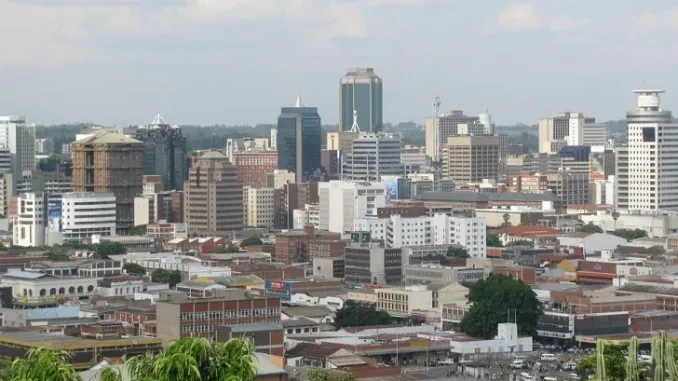
IN RECENT days, the indigenisation policy has dominated our thoughts and our sense of amusement.
By Lance Mambondiani
Not so much for what the policy is about, but for issues such as veiled criticism by the President aimed at the minister, those brainworks advisory services invoices which induce a sense of shock, the now ill-fated search warrants and attempts by Zimbabwe Anti-Corruption Commission (Zacc) to investigate some of the transactions completed by the National Indigenisation and Economic Empowerment Board (NIEEB).
The plot thickens with a trail of leaked documents at the subterfuge hands of the shadowy and “amorous” rubble-raiser called Amai Jukwa and of course the emergence of governor Gideon Gono’s as the “dissent within”.
The governor who proposes a Supply and Distribution-Based Indigenisation (SaDIE) model argues like most of us, that in its current format, the indigenous policy has not and may not benefit ordinary Zimbabweans.
The governor’s approach is quite similar to MDC-T’s indigenisation proposals outlined in its economic blueprint. Assuming the similarity was a coincidence, the alternative approach contrasted with the “one size fits all” equity approach shows the governor as a man veering to the “right” like a broken supermarket trophy.
Touch not our policy There are many who argue that Zimbabwe needs such a policy. There is an equal number who argue that the indigenisation policy is largely populist, hardly egalitarian and favours the politically connected ahead of ordinary Zimbabweans.
In my previous submissions I have questioned whether the policy can be a pathway to economic growth. What is equally suspect is that general logic by its proponents that without this policy we are doomed for peril.
- Chamisa under fire over US$120K donation
- Mavhunga puts DeMbare into Chibuku quarterfinals
- Pension funds bet on Cabora Bassa oilfields
- Councils defy govt fire tender directive
Keep Reading
While it can address the inequalities of the past, it cannot spur economic growth. What the country needs are broad drivers of economic growth which support the private sector, the small-to-medium enterprises and reintegration into the world economy.
The assumption that in any economy anywhere in the world everyone and anyone can be an owner of a company is patently dishonest. It may be hugely popular, but it’s hardly a realistic proposition. Recent contestations and ideological difference within Zanu PF on how the policy should be implemented have been particularly useful.
Serious questions have to be asked regarding how transparent the process has been. These questions may have resulted in commissioners from the Zacc being charged with corruption the “untouchable” governor being thrown to the lynch mob.
This is either coincidental or a clear indication that the proponents of the policy will tolerate no dissent especially from those within.
No single route to achieve economic growth The major problem with leftish policy makers is a recurrent paranoia of a lurking imperialist on every corner and a militant belief that for a policy to be effective it has to be implemented with venomous confrontation and vitriolic abrasiveness.
Any criticism or opposition of policies such as the land reform programme or the indigenisation policy is equated with treachery despite obvious weaknesses or potential for improvements.
The idea that only one person or only a few people in society forever have the answers for our problems is an affront to an open society. Policies are nothing if not open to the rigours of debate or strengthened by opposition.
For every right thinking Zimbabwean, the real question should be how policies such as Indigenisation (Zanu PF), Juice (MDC-T) and Action (MDC) will contribute to economic growth.
As we approach the next elections, these policies should be interrogated.
Our priority should be government policies which provide an enabling environment for the flourishing of the talents of all people to harness and develop their productive potential to ensure they play a leading role in the allocation of national resources.
Policies should put bread on the table National agenda should focus on creating a friendly business environment which encourages investment and growth rather than discourage it.
An effective economic policy should focus on addressing our problem with unemployed by supporting the private sector, entrepreneurship, small businesses and integration of the informal sector into the mainstream economy. We must face up to our economic problems and have a clear plan to address them.
After years of endless conflict, Zimbabweans deserve an economy in which the State, private capital and other forms of social ownership complement each other in an integrated way to eliminate poverty and spur economic growth through a democratic developmental State with the capacity to mobilise resources towards a common national agenda.
We must dispel the fallacy that we can only grow our economy through indigenisation, that there is only one route to achieve it or that infantile belief that those who propose different deserve to be lynched.
The right to ask questions Like land redistribution, no one can argue against indigenisation as a justifiable imperative. The country’s economic transformation requires a restructuring and democratising of ownership and control of the economy by empowering the historically oppressed to play a leading role in the mainstream economy.
However, inequality is not the only, neither is it the main reason why growth rates have been disappointing.
What the policy shouldn’t do is to replace a white capitalist with a black one.
At the very least, ordinary people like you and me for whose benefit the policy is intended, have a legitimate right to question how the policy is being implemented and who has benefited from what. Those questions should be asked without fear of sledge-hammer response.
Even though the anti-corruption commissioners have been arrested or Gono silenced, NIEEB cannot dismiss the criticism that the indigenisation process, at the very least raises serious questions regarding the propriety of some of the transactions concluded.
Dr Lance Mambondiani is a development economist and a Zimbabwean banking expert. He Lectures International Finance and Development at University of Central Lancashire Business School. Contact email [email protected] . Twitter @DrMambondiani











